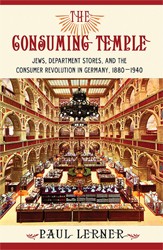Christoph Kreutzmüller is the author of Final Sale in Berlin: The Destruction of Jewish Commercial Activity 1930 – 1945, a history of the German foreclosure of Jewish businesses before and during the Third Reich. Christoph is blogging this week as part of the Visiting Scribe series on The ProsenPeople.
Through lucky circumstances some would call fate I got in contact with a man named Ben. In the desperate situation after the pogrom, his parents send him and his brother out of Germany. In the moving book Ten Marks and a Train Ticket: Benno’s Escape to Freedom Ben’s daughters tell their father’s story of crossing the Dutch border illegally with his older brother in January 1939. The brothers were then lucky to be taken care of by the Jewish Refugee Committee and send to England. They never saw their beloved family again. Ben’s parents, Max and Golda Wisen, and their youngest son, Charlie, stayed behind.
Like many other Jews, Max had set up a tailor business in the house where the family lived in Fehrbelliner Strasse, north of the city centre and Alexander Square. In a family photo taken in 1936 or 1937 (pictured above), one can see that the Wisen’s also offered mending and dry cleaning. Ben remembers how he loved to watch his father working “with a tape measure around his neck and a pin in his mouth.”
Of course, I wanted to help and find out more. Checking the Berlin directory from the time period, I could at least ascertain that Max Wisen first established his business in 1929 in a cellar of a house in Kreuzberg. In 1933 he is listed as a custom tailor right in the middle of the Scheunenviertel, where many Jews from Eastern Europe lived. In the same year he and his business seem to have moved to Fehrbelliner Strasse, listed in this street in the directory for 1934. But then the traces ran dry. Ben’s father’s shop had not been registered in the commercial register, which forms the backbone of the Database of Jewish Businesses in Berlin. A company had to have considerable turnover and substantial capital to be looked at as full merchant to be registered in the commercial register; Wisen’s business was just too small for a registration,  like thousands of others: statistically, there were 250,000 businesses in Berlin, but only 50,000 of them were in the commercial register. Still, we have to stick to the registries file, since all other documents related to commercial enterprises were destroyed in the war. Alas, there is no way to trace little businesses back.
like thousands of others: statistically, there were 250,000 businesses in Berlin, but only 50,000 of them were in the commercial register. Still, we have to stick to the registries file, since all other documents related to commercial enterprises were destroyed in the war. Alas, there is no way to trace little businesses back.
A request to the archive of the International Tracing Service in Bad Arolsen ellucidated that Max was forced to work as a slave labourer for a factory in Berlin, and perished in 1940. In 1943, Golda and Charlie tried to escape deportation, but — according to a note I found coincidentally in the police files in the State Archive of Berlin in Landesarchiv — they were reported to the police by neighbours. Both were murdered the day they arrived in Auschwitz-Birkenau, on March 13, 1943.
Christoph Kreutzmüller is curator at the Jewish Museum of Berlin. His exhibition Final Sale: The End of Jewish-Owned Businesses in Nazi-Berlin has been shown in the Leo Baeck Insitute, New York, Hebrew University in Jerusalem and at Boston University.
Related Content:
- Barry Schwartz: The First Jewish Debate
- Gerald Koplan: Blazing Saddles It Wasn’t
- Ruchama King Feuerman: Sweet Judgement
Christoph Kreutzmüller is curator at the Jewish Museum of Berlin. After finishing his dissertation on German banks in the Netherlands over 1919 – 1945 at Humboldt University, he worked at as a senior historian for the House of the Wannsee Conference. His exhibition Final Sale: The End of Jewish Owned Businesses in Nazi-Berlin has been shown at the Leo Baeck Insitute, Hebrew University (Jerusalem), and Boston University.
Adding Dimension to the Online Database of Jewish Businesses in Berlin




